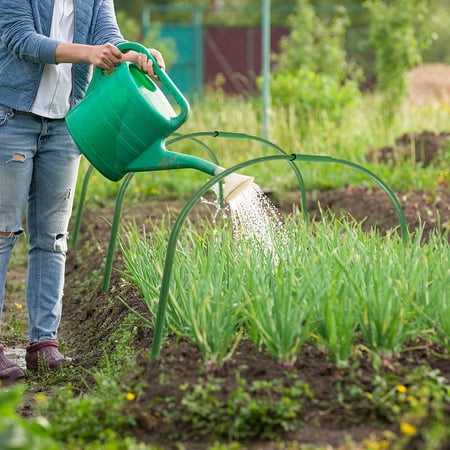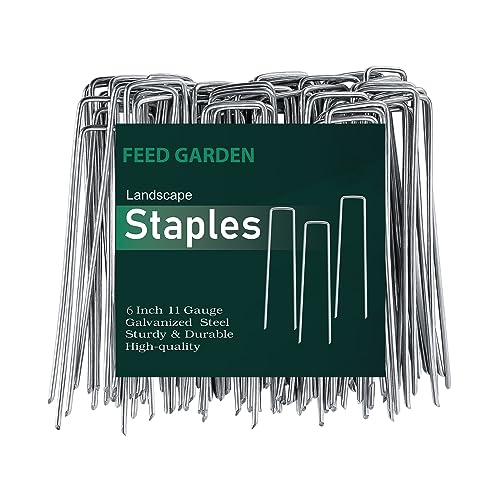How to get rid of caterpillars from a vegetable garden – and natural ways to repel them
Discover the best methods to combat caterpillars, as recommended by vegetable garden experts
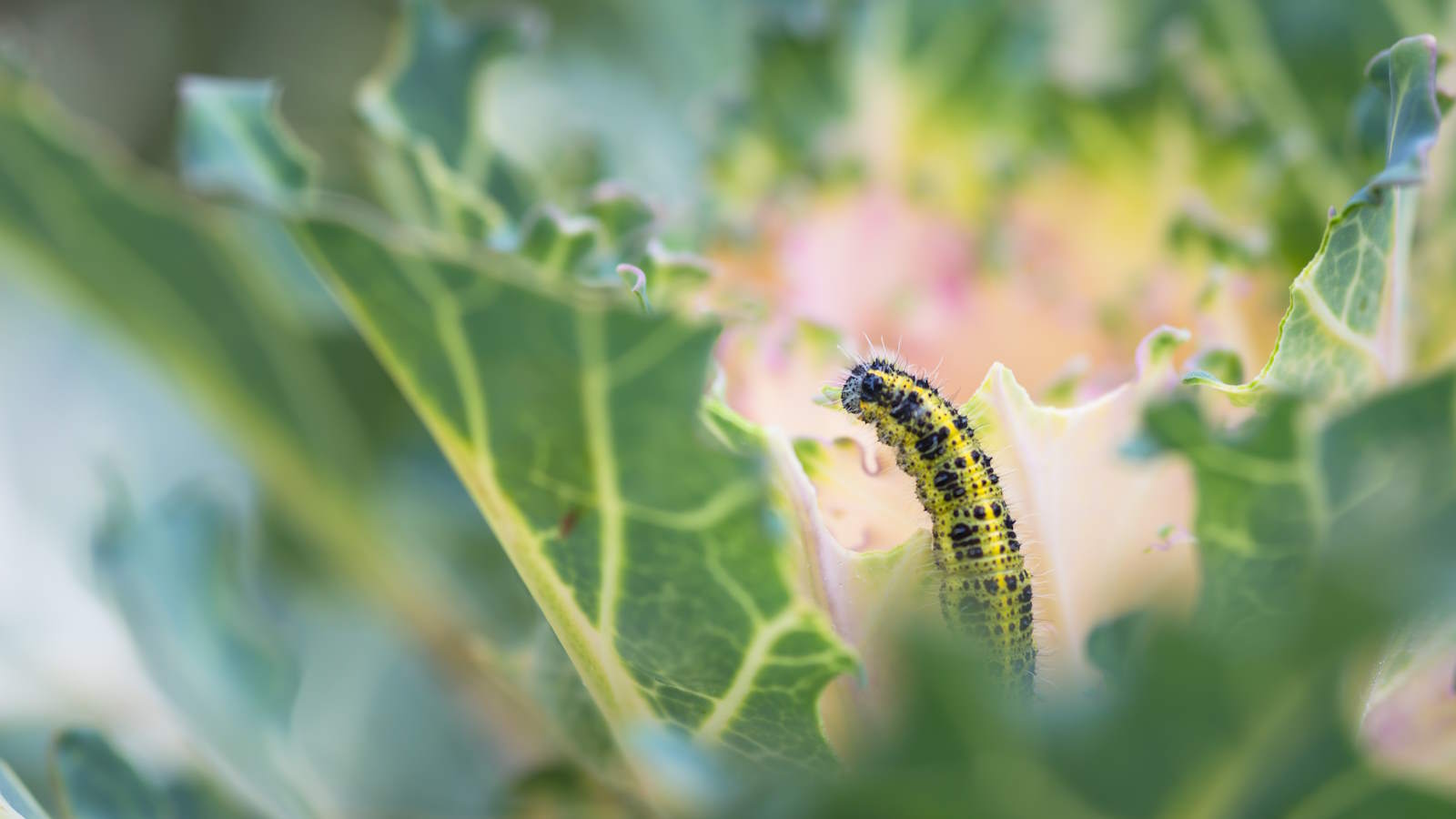

Caterpillars are an all-too-common pest in a vegetable garden. This destructive pest is a particular fan of brassica plants, and to make matters worse caterpillars can reproduce quickly as they munch their way through leaves.
I, along with the vast majority of growers, have experienced caterpillar damage at some stage and battled these pests in vegetable gardens over the years. Thankfully, you can take simple control measures to protect plants.
Even if you do spot the tell-tale signs of caterpillar damage, there are organic and natural measures to get rid of them for good - and protect your vegetables.
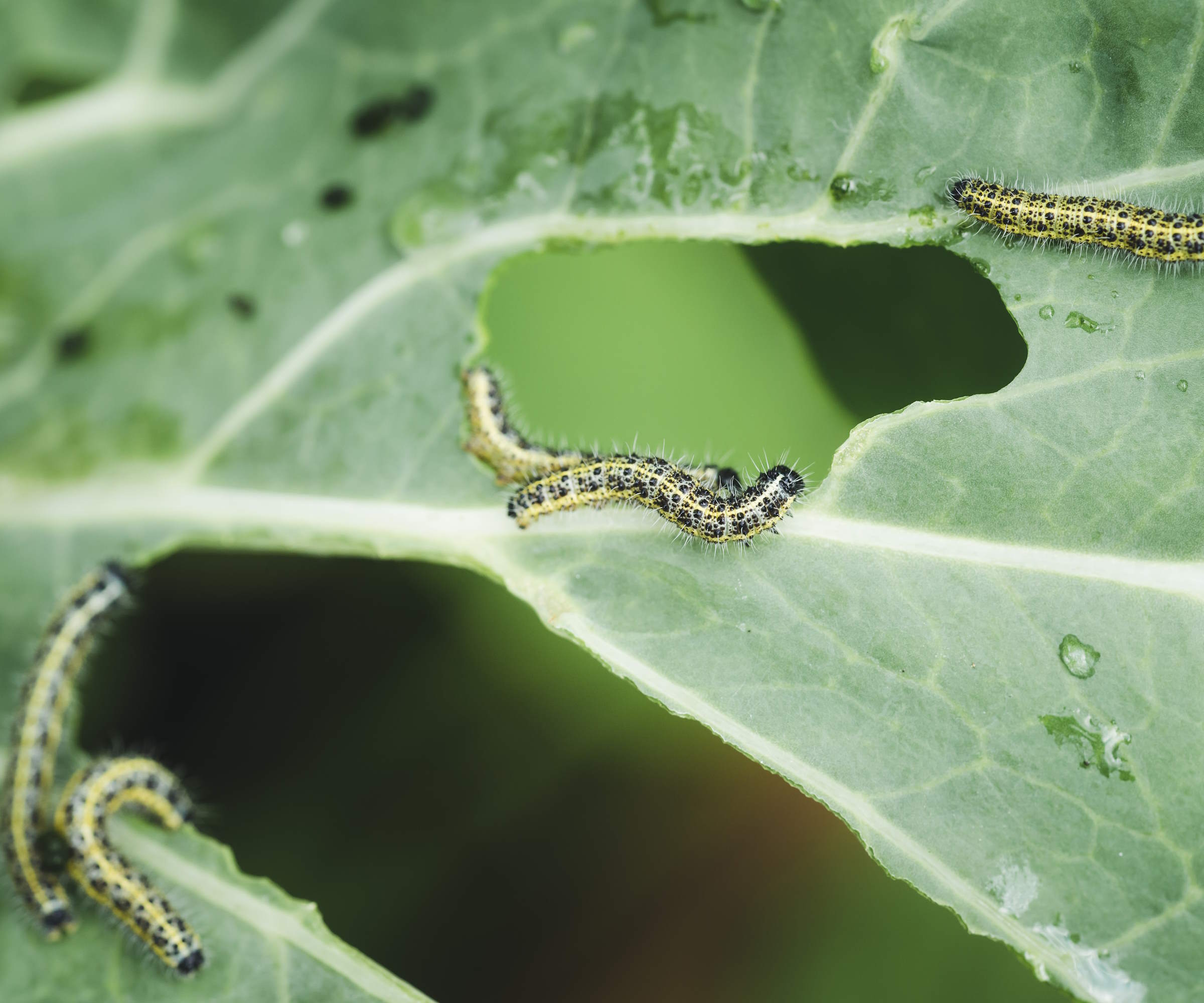
Caterpillars will cause huge damage in a vegetable garden if left to breed and continue munching on plants
What are caterpillars?
Caterpillars are the larval stage of butterflies and moths. The most common caterpillars in a vegetable garden are cabbage worms, which become cabbage white butterflies, and cabbage loopers.
Caterpillars are particularly attracted to plants in the Brassica family, including cabbages, kale, Brussels sprouts, cauliflower, and more. The moth needs to get to your vegetable plants and lay its eggs to start a caterpillar infestation - and it can lay hundreds of eggs.
Each larvae will grow and develop as they eat vociferously for around two weeks before entering a cocoon and emerging as a moth, to start the life cycle again as they lay their eggs.
Signs of caterpillar damage to look for
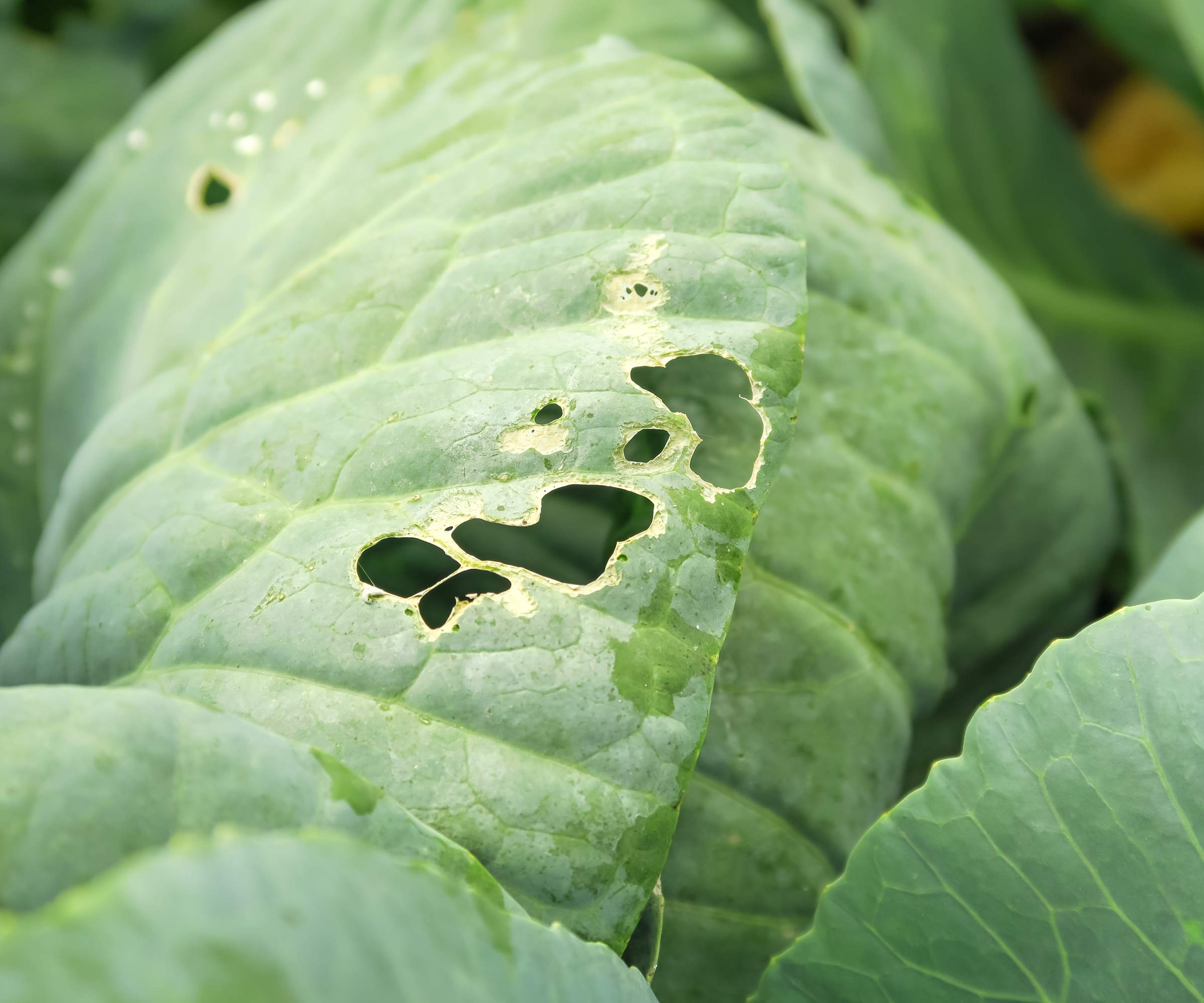
The presence of caterpillars in a vegetable garden will be shown through holes in leaves
Caterpillar damage will be most evident on the leaves of plants. They have voracious appetites and produce irregularly-shaped holes on leaves through chewing. Caterpillars may be small, but they can decimate a plant and are capable of shredding leaves.
Keep your eyes peeled for holes in leaves, or the edges of leaves being chewed. If a plant suffers from a major infestation, there may be full leaves missing. At the first sign of any damage, check the underside of leaves - as this is where you are likely to find young caterpillars and clusters of yellow eggs.
How to keep caterpillars out of a vegetable garden
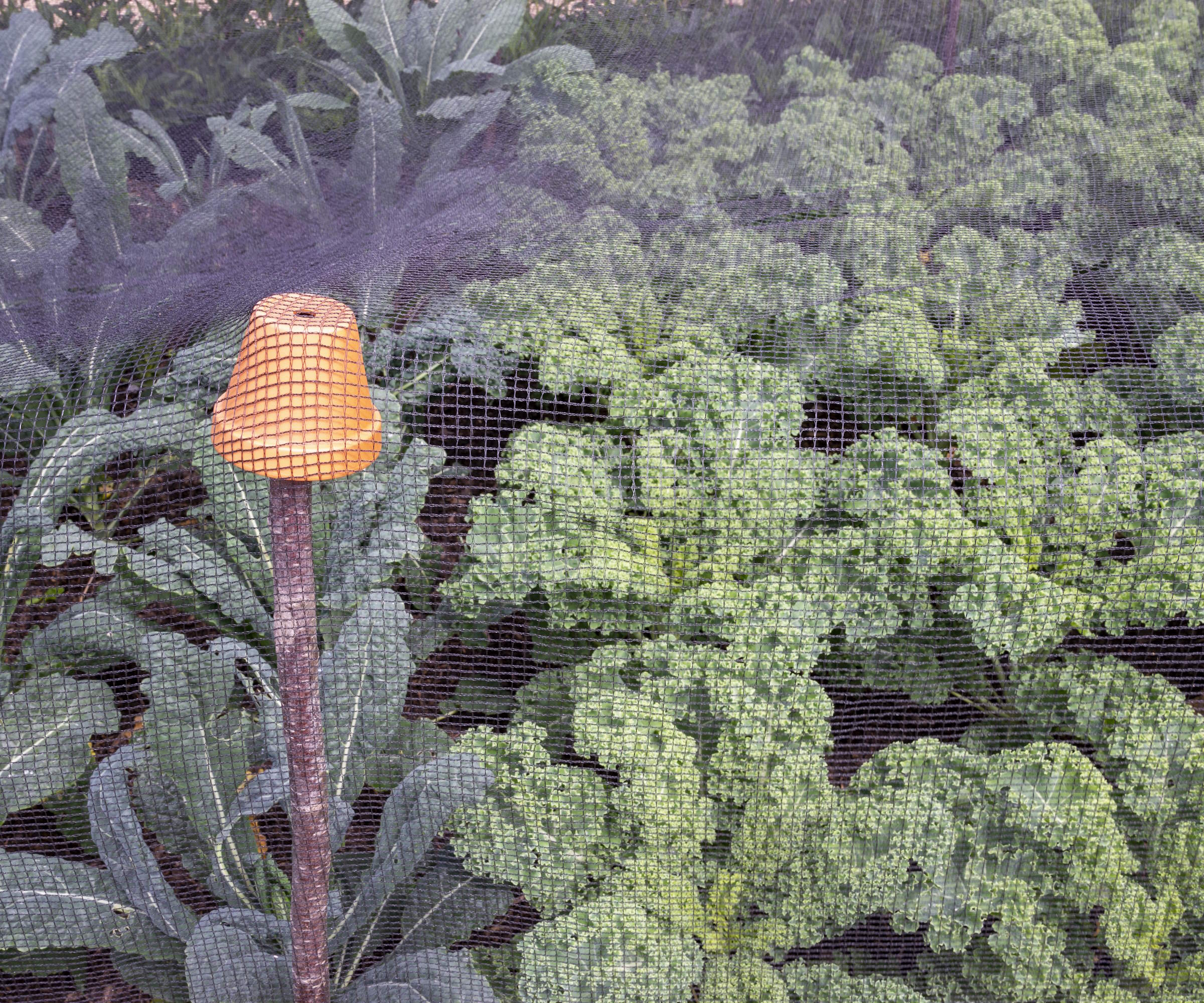
Insect netting can keep caterpillars out of your vegetable garden
The simplest, and most common, way of keeping caterpillars away from your precious vegetable plants is to cover them. Protecting brassica plants with physical barriers is an easy method of preventing pest infestations - and something I have always done in vegetable gardens I worked in, as well as on my allotments.
The best materials to use are garden fleece, a floating row cover, or fine insect netting - which should be put in place as soon as you plant the seeds or transplant seedlings into the garden. It is advisable to place the material over hoops so it is raised off the plants, otherwise, moths can lay their eggs through the netting if the leaves are in contact with it.
‘The idea is to cover the entire garden space in a fine mesh netting that’s secured at the bottom with landscaping pins or clamps. Make sure to leave no gaps,’ says Crystal Jarvis from Lettuce Grow Something. ‘The small holes in the mesh allow air, sunlight, and water through, but keep moths out. You can pull the mesh back when needed to tend and harvest, but otherwise, you’ll leave these in place throughout the growing season.’
Covering plants protects them from hungry caterpillars and other pests, as well as adverse weather conditions. As brassica plants do not need to bloom and be pollinated, you do not need to worry about pollinators being unable to access the plants due to the covers.

Crystal Jarvis is Owner and Garden Consultant of Lettuce Grow Something. They design beautiful raised bed kitchen gardens for the novice to expert gardener in Austin, TX and virtually all over the world. She is skilled in raised bed garden design and organic vegetable gardening.
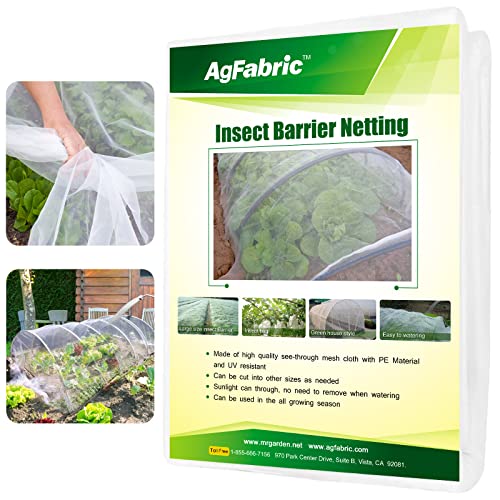
Insect netting to protect vegetables, flowers, plants and fruits from birds, moths and insects while letting water, air and sunshine get through.
How to get rid of caterpillars in a vegetable garden
Even with fine insect netting in place, I have had pesky caterpillars appear on my plants. The moths either found a gap to get in or made it to the plants while I removed the covers to weed or harvest crops.
If you do spot the signs of caterpillar damage, it is best to act fast as they can replicate quickly. There are chemicals that can kill the pests, but it is not advisable to use chemical products on edibles.
It is always better to use natural and non-toxic ways to deal with caterpillars - and luckily there are several methods at your disposal to get rid of them.
Pick them off by hand
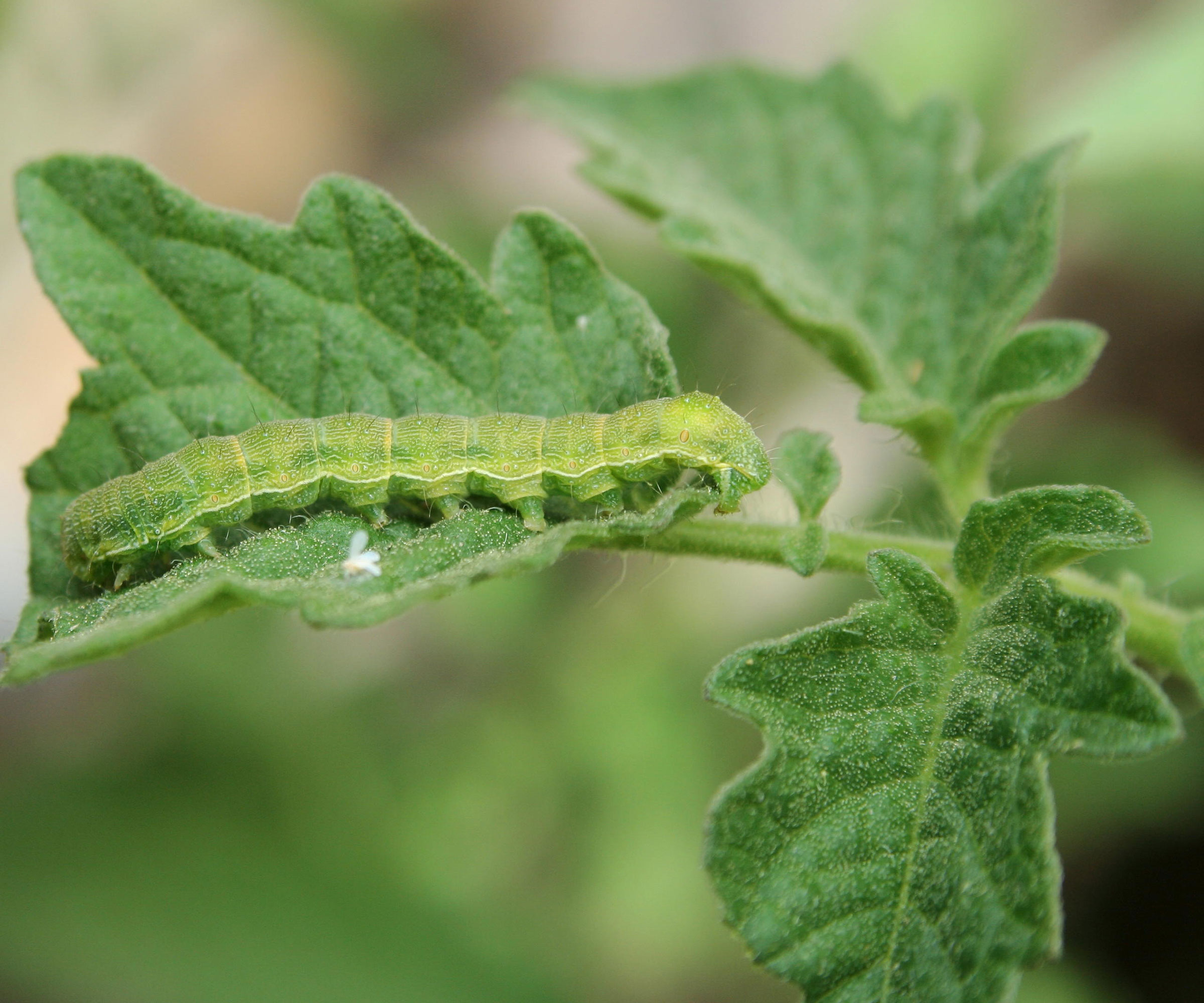
Keep caterpillars at bay in your vegetable garden through regular checks and removal
Undoubtedly the simplest method to get rid of caterpillars is to be highly vigilant and remove them by hand. At the first sign of issues, don a pair of gloves and check plants, particularly the underside of leaves, to remove any and all caterpillars you see.
‘While hand-picking the caterpillars, have a small container of water with a couple of squirts of dish soap close by,’ advises Susan Mulvihill, author of ‘The Vegetable Garden Pest Handbook’. ‘Toss the caterpillars into it. The soap will break up the surface tension in the water, preventing them from getting out of the container.’
Continue to check plants regularly, looking between leaves and inspecting any hiding spots on the plant, and pick off any caterpillars you see.

Susan Mulvihill is the author of 'The Vegetable Garden Problem Solver Handbook', available at Amazon and 'The Vegetable Garden Pest Handbook', also available at Amazon. She gardens on 5 acres in Spokane, Washington State and has also been writing garden columns for the Sunday edition of The Spokesman-Review newspaper for nearly 20 years.
Use organic sprays
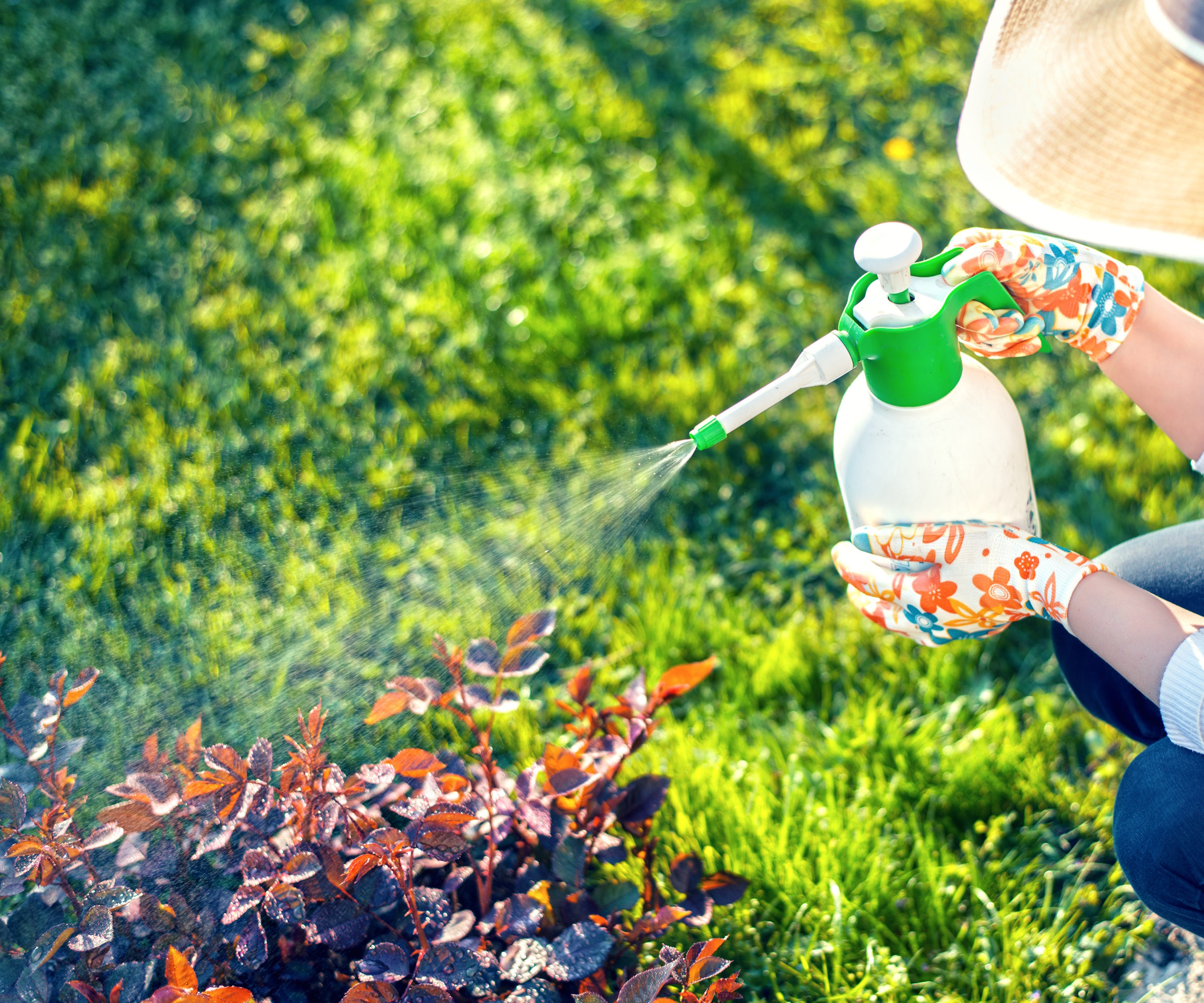
Sprays can get rid of caterpillars causing damage in a vegetable garden
Organic insecticides contain Bt (Bacillus thuringiensis kurstaki) and it is a bacterial that controls caterpillars. It is a naturally occurring bacteria that is sprayed onto plants and kills caterpillars after they ingest it, though it does not hurt humans, bees, or other beneficial insects.
‘Simply spray it on the leaves of your plants, focusing on areas where caterpillars are present,’ says Crystal Jarvis. ‘It’s best to spray in the evening because Bt degrades in the sunlight. Repeat the application every week as needed, especially after rainfall - which will wash Bt off the leaves.’
An alternative is to use neem oil spray, which suffocates the caterpillars and stops them munching their way through your plants.
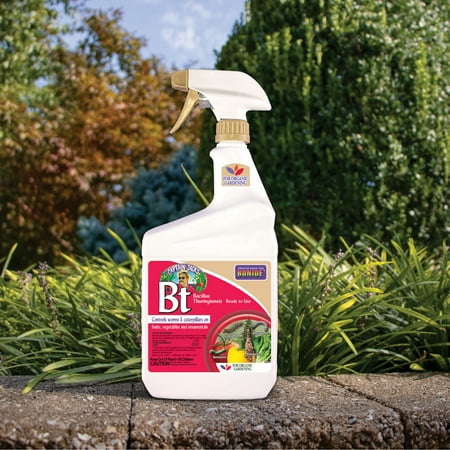
A ready-to-use spray designed for organic gardening to control destructive worms and caterpillars in and around vegetable and flower gardens. It can be used to get rid of cabbage looper, hornworms, tent caterpillar, gypsy moth, bagworm and many more.
Make a homemade spray
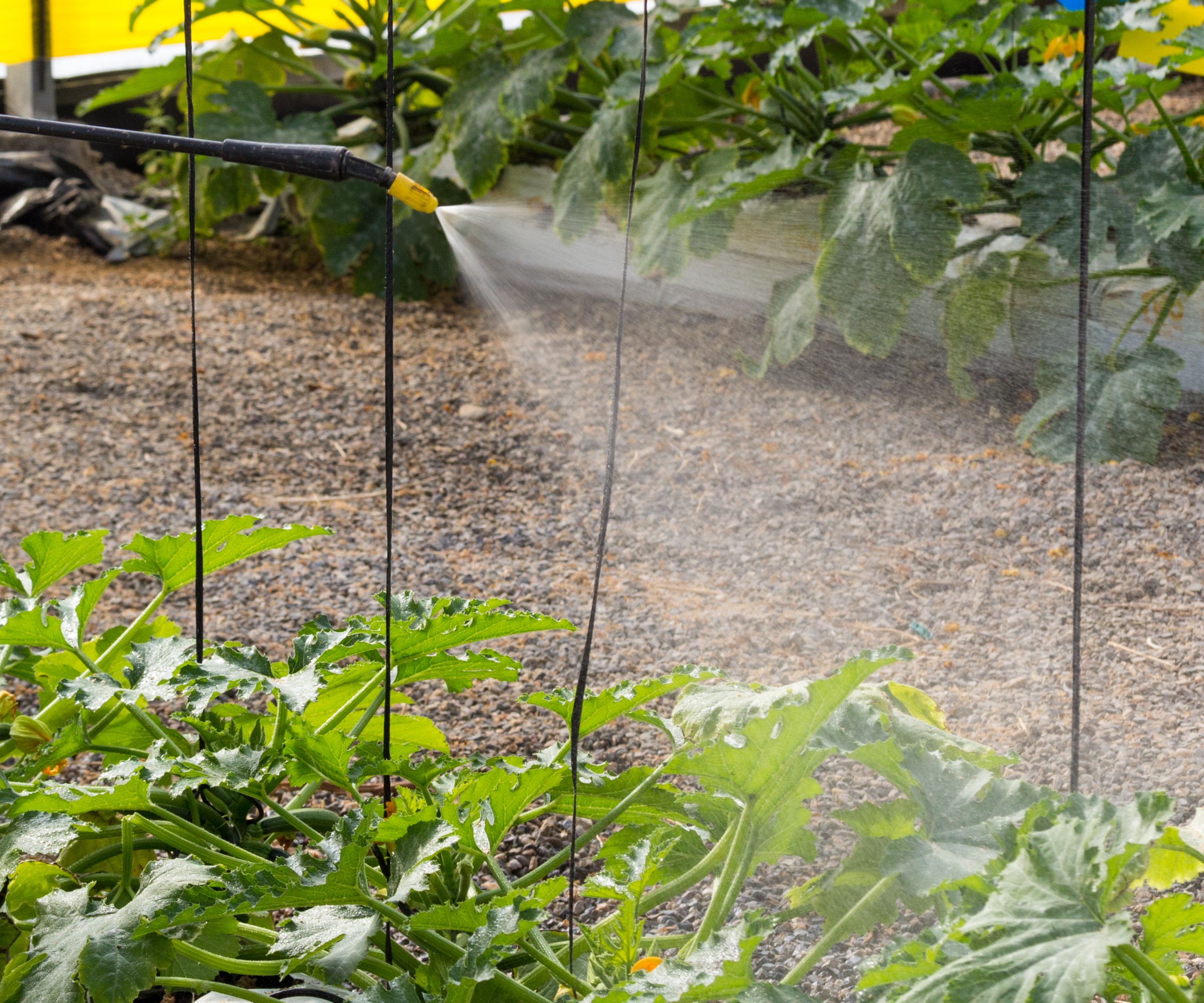
Spraying plants with pungent smells can get rid of caterpillars from the vegetable garden
A homemade bug spray can be made by mixing a few tablespoons of vinegar with a gallon of water, which you spray wherever caterpillar damage has been spotted.
An alternative is to create a spray of finely chopped chili peppers and crushed garlic, with a teaspoon of liquid dish soap added, by mixing the ingredients and letting them combine for two days before applying the spray all over the plants.
Companion planting
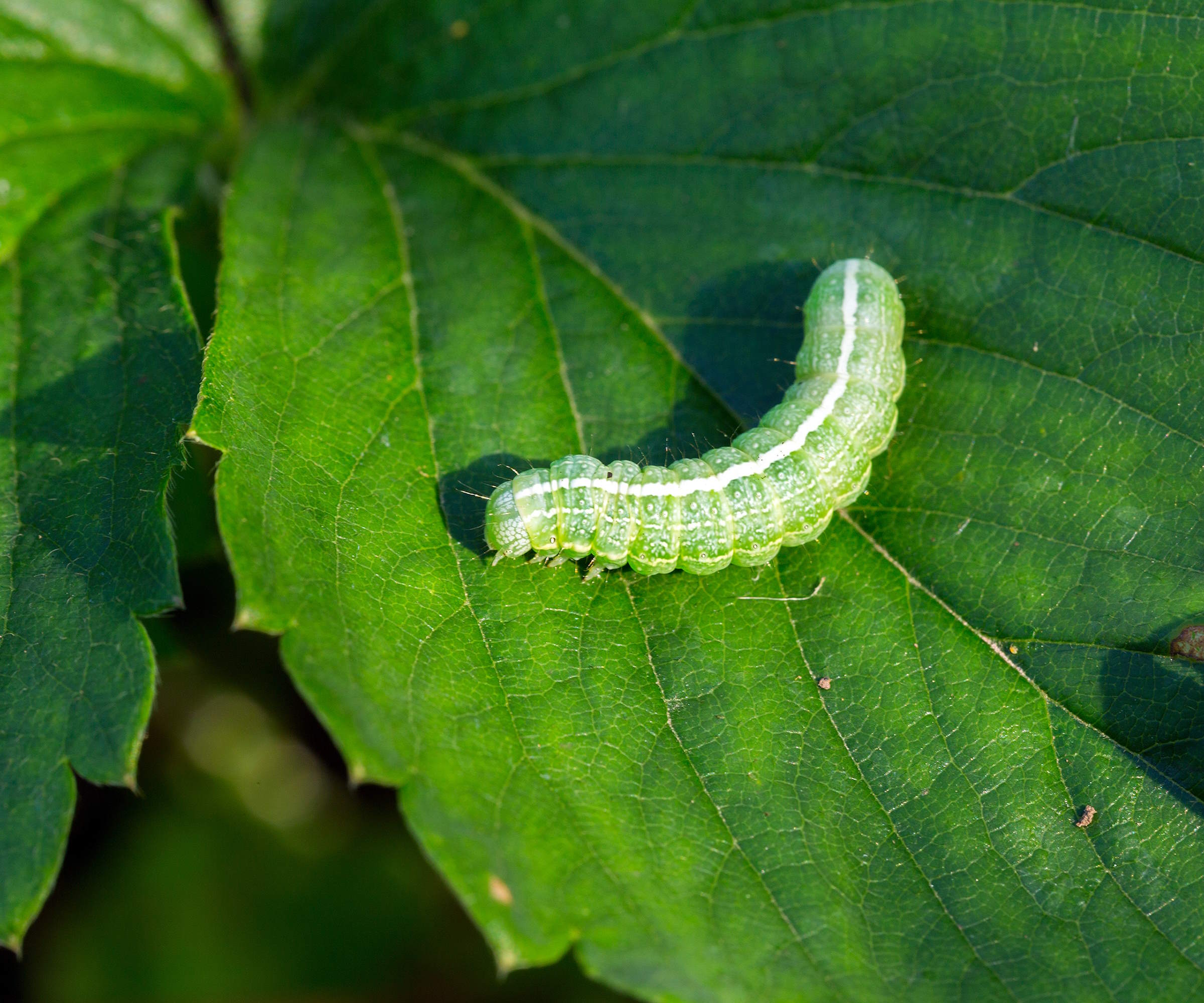
Attract birds and other predators to eliminate any caterpillars in your vegetable garden
Companion planting can be a natural solution to caterpillars - and there are three different ways it can benefit your vegetable garden.
Firstly, planting strong-smelling herbs can deter moths away and stop them from laying their eggs on plants. In addition, planting flowers in a vegetable garden and other companion plants can attract birds and beneficial insects that will eat caterpillars.
And finally, you can use plants such as nasturtiums around the vegetable garden as trap plants to attract the caterpillars and keep them away from precious vegetables.
FAQs
What do caterpillars hate the most?
Caterpillars do not like powerful smells. They have a really strong sense of smell and that is why plants with pungent scents, such as aromatic herbs like lavender, rosemary, peppermint, and sage are good companion plants to deter them. Their dislike for strong smells also helps spray made of vinegar, garlic, and pepper a potentially successful way of deterring them.
Does soapy water kill caterpillars?
Crystal Jarvis from Lettuce Grow Something claims that ‘spraying soapy water on caterpillars probably won’t do too much damage to the pests’. While using soapy water as a homemade spray won’t get rid of caterpillars, Crystal does agree with the recommendation to take a bowl of soapy water out with you to the garden and place caterpillars into the bowl.
It is not just vegetables that are susceptible to caterpillars. Gypsy moth caterpillars cause damage to many trees, including oak, apple, birch, and willow. Discover how to deal with these damaging pests in our guide to how to get rid of gypsy moth caterpillars from your garden.
Sign up to the Homes & Gardens newsletter
Design expertise in your inbox – from inspiring decorating ideas and beautiful celebrity homes to practical gardening advice and shopping round-ups.

Drew’s passion for gardening started with growing vegetables and salad in raised beds in a small urban terrace garden. He has worked as a professional gardener in historic gardens and specialises in growing vegetables, fruit, herbs, and cut flowers as a kitchen gardener. That passion for growing extends to being an allotmenteer, garden blogger, and producing how-to gardening guides for websites. Drew was shortlisted for the New Talent of the Year award at the 2023 Garden Media Guild Awards.
-
 It’s a concept straight out of a fashionista's playbook, but I used the Sandwich Method to organize my kitchen shelves – it’s never looked sleeker
It’s a concept straight out of a fashionista's playbook, but I used the Sandwich Method to organize my kitchen shelves – it’s never looked sleekerIt transformed messy to mesmerizing in a matter of seconds
By Punteha van Terheyden Published
-
 The moody kitchen in this Victorian home has the most unique wall design I've ever seen – it's the perfect way to bring an elegant, aged feel to the space
The moody kitchen in this Victorian home has the most unique wall design I've ever seen – it's the perfect way to bring an elegant, aged feel to the spaceThe hand-painted feature has brought a sense of history and patina back into the remodeled kitchen
By Molly Malsom Published
